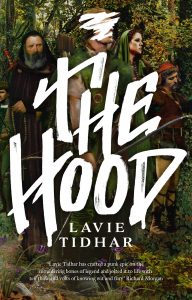Gary K. Wolfe Reviews The Hood by Lavie Tidhar
 The Hood, Lavie Tidhar (Head of Zeus 978-1-838-93131-5, £18.99, 448pp, hc) October 2021.
The Hood, Lavie Tidhar (Head of Zeus 978-1-838-93131-5, £18.99, 448pp, hc) October 2021.
Lavie Tidhar’s ambitious four-novel revisiting of British mythology – which he calls the Anti-Matter of Britain – began with last year’s By Force Alone, a cheerfully anarchic and thoroughly entertaining assault on Arthuriana, and now, with The Hood, it moves forward a few centuries to the 12th-century era of Robin Hood legends. But while Tidhar could safely assume that his readers were familiar with the endlessly revisited narrative arc of the Arthur legends, Robin Hood survives in pop culture less as a coherent story than as a premise for stories: a bunch of “hoods in the woods” (to use Tidhar’s own phrase), robbing the rich and sometimes giving to the poor, with their nemesis the Sheriff of Nottingham and a vague love interest in Maid Marian. In a way, this gives Tidhar greater freedom to improvise, and he takes full advantage of it: by the time we’re done with a tale that covers almost a century, we’ve met multiple iterations of both Robin and his gang and the Sheriff, some borrowed from the old Child ballads, some from a 15th -century text called A Gest of Robin Hode, while Maid Marian becomes a near-mythical nature spirit whose own story dates back centuries. She shows up in so many versions of the Robin story that I was almost surprised not to see Marian the librarian, though she does get a girl-from-Ipanema moment (“young and tall and tan and lovely, the girl of Robin’s dreams goes walking…”) Surprisingly, though, none of these iconic figures really occupy the center of the book, whose web of stories-within-stories focuses more often on characters far less familiar, and far more intriguing.
Chief among these is a young woman named Rebecca, the daughter of the Jewish moneylender Isaac of York from Walter Scott’s Ivanhoe (probably little read these days, but for a long time one of the most popular sources of Robin Hood tales). We meet her as an 18-year-old managing her father’s accounts, as an assistant witch who has occasional visions of the future, and most delightfully as the leader of a formidable girl gang which includes some other minor figures from Ivanhoe such as Rowena, Elgitha, and Ulrica. Other figures play out their own narrative arcs – Will Scarlett, whom we first meet participating in an elaborate heist caper involving the Knights Templar; the gender-fluid harpist Alan-a-Dale, seeking the murderer of his sister (and switching genders occasionally); Robin himself – but Rebecca’s is the most consistent through-line in the novel, and we last see her as an old woman in troubled sleep having visions of a Mongol invasion, of all things (which was actually underway by then, probably in the 1230s).
The Hood is organized more like a chronicle than a novel, divided into 17 parts that begin with a classic medieval legend of Maid Marian and the Elfin Knight – which also serves as a kind of origin story for the Great Oak around which the Merry Men assemble – and leaps forward a few years at a time, beginning in 1145, when we first meet Will Scarlett. As he makes clear in an historical afterword, Tidhar has done his research – there were indeed Jewish communities in medieval England, and the Crusades figure significantly into parts of the story – but as we’ve come to expect from a Tidhar novel, the research is hardly a constraint on playfulness: the bumbling town guardians of Nottingham are named Bert and Ernest, a cook named Mrs. More-Goose turns out to be Merlin’s cousin Morgause (not the only link to Tidhar’s earlier By Force Alone), another gang leader in Nottingham is Reynard the Fox, Alan-a-Dale has a run-in with Rumpelstiltskin (don’t ask), and a mysterious part-avian figure named Birdie – whose true identity eventually emerges – is a kind of universal observer. If By Force Alone surprised us with a kind of side-trip to Roadside Picnic, The Hood takes a brief foray into Frankenstein, when Gilbert Whitehand, a pretty obscure character in the original legends, becomes an obsessive collector of body relics alleged to be bits of Jesus (they were apparently all over Europe, like a Pokémon for medieval monks) hoping to construct a more-or-less complete homemade Savior. It doesn’t go well. The Hood may not offer as linear a narrative as By Force Alone (though, as I mentioned earlier, the source tales aren’t that linear to begin with), but it offers a wealth of colorful tales and memorable characters, along with the usual unexpected walk-ons and guest stars. If it sometimes feels like a bunch of legends and historical events stirred together in a big pot, isn’t that pretty much what the Matter of Britain was in the first place?
Gary K. Wolfe is Emeritus Professor of Humanities at Roosevelt University and a reviewer for Locus magazine since 1991. His reviews have been collected in Soundings (BSFA Award 2006; Hugo nominee), Bearings (Hugo nominee 2011), and Sightings (2011), and his Evaporating Genres: Essays on Fantastic Literature (Wesleyan) received the Locus Award in 2012. Earlier books include The Known and the Unknown: The Iconography of Science Fiction (Eaton Award, 1981), Harlan Ellison: The Edge of Forever (with Ellen Weil, 2002), and David Lindsay (1982). For the Library of America, he edited American Science Fiction: Nine Classic Novels of the 1950s in 2012, with a similar set for the 1960s forthcoming. He has received the Pilgrim Award from the Science Fiction Research Association, the Distinguished Scholarship Award from the International Association for the Fantastic in the Arts, and a Special World Fantasy Award for criticism. His 24-lecture series How Great Science Fiction Works appeared from The Great Courses in 2016. He has received six Hugo nominations, two for his reviews collections and four for The Coode Street Podcast, which he has co-hosted with Jonathan Strahan for more than 300 episodes. He lives in Chicago.
This review and more like it in the October 2021 issue of Locus.
 While you are here, please take a moment to support Locus with a one-time or recurring donation. We rely on reader donations to keep the magazine and site going, and would like to keep the site paywall free, but WE NEED YOUR FINANCIAL SUPPORT to continue quality coverage of the science fiction and fantasy field.
While you are here, please take a moment to support Locus with a one-time or recurring donation. We rely on reader donations to keep the magazine and site going, and would like to keep the site paywall free, but WE NEED YOUR FINANCIAL SUPPORT to continue quality coverage of the science fiction and fantasy field.
©Locus Magazine. Copyrighted material may not be republished without permission of LSFF.






